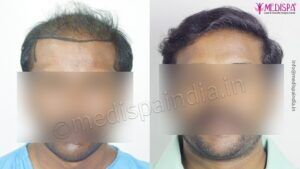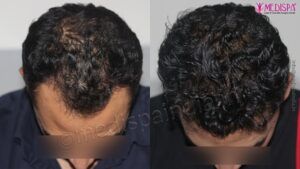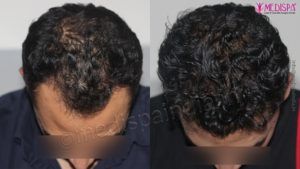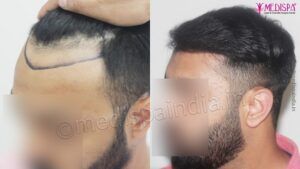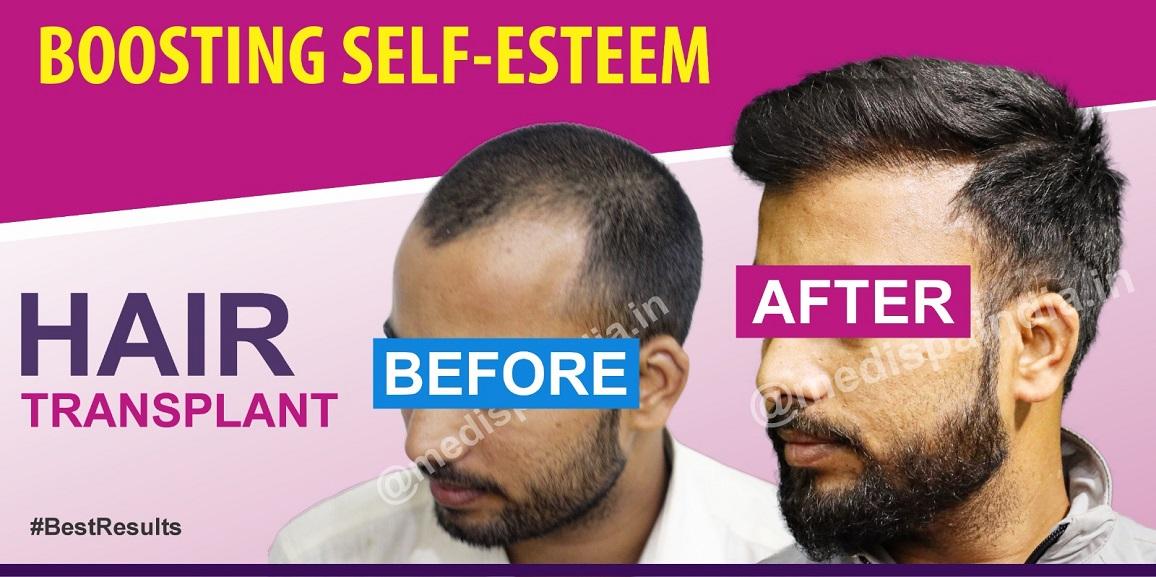
A hair transplant, a minimally invasive procedure, involves the relocation of hair follicles from the donor site to the recipient site. It is crucial to have a skilled and highly qualified hair transplant surgeon perform this surgery to ensure its safety. The procedure consists of several steps:
- Administering anesthesia to the patient.
- Extracting grafts from the donor site using either the FUT or FUE procedures.
- Implanting the hair follicles into the recipient area.
- Optional PRP treatment to aid in recovery and growth.
- Washing the hair the day after the surgery.
After undergoing a hair transplant, patients are provided with a set of guidelines and precautions that must be strictly followed to avoid complications and achieve optimal results. Fortunately, any negative effects of the procedure are minor and temporary, lasting only a few days. Therefore, there is no need to worry. Prepare yourself for a hair transplant experience that will make your dreams come true with the assistance of the best hair transplant surgeon.
Hair Transplant
Despite the availability and popularity of hair transplant in Chennai, there is a wide range of prices, with the cheaper options being more prevalent. The hair transplant cost in Chennai is relatively low, but this has led to a decline in the quality of facilities and care provided. The emergence of cheaper providers has compromised the quality of treatment, resulting in frequent reports of disastrous outcomes.
When it comes to the best hair transplant surgeons in Jaipur and Delhi, one name consistently appears on every list: Dr. Suneet Soni. He is widely recognized as one of the most renowned and acclaimed hair transplant doctors in the country. Dr. Suneet Soni’s exceptional skills and expertise ensure flawless and remarkable results in hair transplants. The credit for Medispa Hair Transplant Clinic’s leading position in the industry since 2005 goes to Dr. Suneet Soni, the owner and creator of the clinic, along with his highly skilled staff.
Follow up care after hair transplant
Aftercare following a hair transplant is crucial for optimal results. While the procedure itself carries minimal risk and complications, it is important to have it performed by an expert to avoid potential complications that can range from mild to severe.
Patients can typically resume their routine work immediately after the procedure, but it is still advised to rest for the remainder of the day. Starting from the very next day, patients are encouraged to gradually return to their normal daily activities. The aftercare for a hair transplant is not overly demanding and only needs to be followed for a minimum of 15 days.
As with any surgery, there are a few side effects associated with a hair transplant. However, since it is a minor procedure, it does not pose a significant risk. Bed rest is not necessary after the procedure, and patients can resume their normal routine the day after. These side effects are generally short-lived and tend to subside within a few days without requiring much intervention. Let’s explore some ways to prevent the occurrence of these side effects after a hair transplant.
Methods to prevent side effects associated with hair transplant
The potential side effects include mild swelling, pain, itching, numbness, and infection. To address these concerns, here are some recommendations:
- To alleviate swelling, it is advisable to sleep with your head elevated at a 45-degree angle using pillows or towels. This position helps reduce swelling, and it typically subsides within 3 to 5 days following the hair transplant procedure.
- Avoiding spicy foods and ice creams can also contribute to minimizing swelling. These types of foods have the potential to exacerbate inflammation, so it is best to steer clear of them during the initial recovery period.
- It is crucial to refrain from smoking and consuming alcohol for at least one week after the hair transplant. These substances can hinder the healing process and increase the risk of complications
- Following your doctor’s instructions regarding the use of a headband is essential. Wearing the recommended headband can provide support and help maintain the proper position of the transplanted hair follicles.
Mild pain is a common occurrence after a hair transplant, but it is usually manageable. If necessary, your doctor may prescribe painkillers to alleviate any discomfort. Typically, the pain subsides within 3 to 4 days after the procedure.
To prevent itching, it is important to regularly wash your scalp as instructed by your doctor. Additionally, applying the recommended lotion can help soothe any itchiness that may arise.
Numbness may occur after a hair transplant, but it typically resolves on its own within a few days to months. If numbness persists for an extended period, it is advisable to consult your doctor for further evaluation.
Infection is a rare complication after a hair transplant, and it can be avoided by ensuring the procedure is performed under hygienic conditions. It is crucial to follow all post-operative instructions provided by your doctor to minimize the risk of infection.
By adhering to these guidelines and maintaining proper hygiene, you can significantly reduce the likelihood of experiencing side effects associated with a hair transplant.
Safety of hair transplant procedure
The safety of a hair transplant procedure is unquestionable. Rest assured that there will be no adverse effects on critical areas as the procedure involves extracting hair roots from the superficial layers of the scalp. However, it is crucial to have an experienced surgeon perform the surgery to avoid any potential complications.
To manage short-term complications, such as itching, it is recommended to wash the scalp regularly and use the prescribed lotion as directed by the surgeon. This discomfort usually lasts for about a week and can be tolerated, but it is important to refrain from scratching the recipient area to prevent infection or displacement of the newly implanted follicles.
If you experience any discomfort that is difficult to tolerate, your hair transplant surgeon will provide appropriate medications. It is important to contact your surgeon immediately if you have severe or unusual discomfort.
After the procedure, you will be provided with a package containing necessary items for caring for the recipient area. It is important to follow the surgeon’s recommendations and regularly clean both the donor and recipient areas. Wearing a headband as prescribed by the surgeon can help reduce swelling, and when going outside, a loose hat should be worn to protect the newly transplanted hair follicles from dirt. It is advised not to touch the recipient area for at least a week.

